August 1945 / August 2015: Is it really true?
Primary tabs
70 years separates these two accounts, both written by Barbara Anslow. Barbara wrote the first one in Stanley Camp not long after the Japanese surrender. She says:
You will see that 'Is it really true' was written on August 24th 1945, 6 days before Admiral Harcourt liberated us. Although I was still writing my diary then, I had this urge to record how things were during the period when we knew the war was over but had no contact with the outside world.
She follows up with a description of taking part in last week's VJ Day ceremonies in London. Over to Barbara...
24th August 1945 - IS IT REALLY TRUE?
Even a week after all this started, we still ask each other is it really true, or is it just another of those dreams which has haunted and tortured us for 3 and a half years? We have been nominally free for a week, but neither envoy nor Fleet having arrived, our suspicious natures are inclined to wonder whether they ever will materialise, or whether this is all a trick. We feel we want to urge the Allies to come while the coming is good, lest the pendulum should suddenly swing the other way, leaving us in a far worse position than that in which we have been for so long. The sure knowledge that the internees and p.o.w.’s in other Japanese-occupied territory in the Pacific are feeling exactly the same as we are makes the situation no easier.
We look out to sea and cry ‘Come on, Nimitz, or Fraser – we’ve been waiting for you for years – now you CAN come, what’s the delay?’ It’s not that we don’t realise the need for caution – perhaps we who have had so much experience of the way things work in this part of the globe, realise the need even more than our relatives at Home who are longing for our release; it’s just one of the strange things about life that it’s harder to be patient for a fortnight, knowing things will end in a fortnight, then it is to live through 3 and a half years which had no definite stopping-place.
Tales (in recent months) that the Russians had declared war on Japan were rife. Rumours of the Potsdam Peace Conference began to filter through to the Camp at the beginning of August; it was said that all the points save one or two had been accepted, or that all had been rejected – you could take your choice. Things, however, really started happening on Friday, August 10th (only a fortnight ago from today) when about 10.30am news whipped round the Camp that 175 technicians and families were leaving Stanley (by Jap. Order) – no details, the list of people was given out and by 2pm that afternoon, they were lining up along the main road with their luggage. We watched them going with mixed feelings – their destination and their fate were equally obscure, but one cheering thought remained uppermost in everyone’s mind – their removal meant that some sort of change was pending, and we couldn’t but think that it was a change in our favour. When the luggage helpers returned they said the people left in a coastal boat.
Between the hours of notification of departure and 2pm, two weddings were celebrated, the bridegrooms being technicians; the brides were not allowed to accompany them, although a Jap. Official comforted one bride with the information that she would be able to join her husband ‘in about ten days’ time’ – he was almost right.
On Monday August 13th there were strong rumours that there would be, or was, Peace, but we didn’t really believe them – according to Stanley the European war ended many, many times before it actually did. On Tuesday morning an incident occurred which killed the peace rumours: one of our planes machine-gunned, bombed and sank a naval patrol boat just past the little island beyond the Camp hospital. I was lying on the grass reading and saw the plane come down very low over us, while the Japanese terrified us by shooting at it with rifles, the cracks of which sounded much more dangerous than they really were. Children playing around shrieked, gardeners popped out of the gardens, and every one (including me) flew for cover. We cynics immediately started ‘I-told-you-so-ing’ to those who had so positively asserted that the war was over; their suggestion that the war being over, the naval boat had no right to move and was for that reason sunk, sounded far too fantastic to be true.
The next morning I arrived home from Mass to find the Camp full of ‘authentic’ rumours that a truce had been called. We were each donated a roll of USA toilet paper – the first real toilet roll most of us have seen for 3 and a half years. I went to Choir practice to practise the ‘Te Deum’. Rumours continued to pour in thick and fast: that there was a Cease Fire at 4pm on the 15th; that Lieut. Kadowaki (Camp Commandant) had smashed the radio when he heard; that our Formosan guards had had parties the previous night (Brother Bonnici, at choir, told us Brother Grimshaw had attended one of these parties); that food ships would be sailing from Manila as soon as the peace was signed.
Later in the day came news that the Emperor had broadcast at 3pm and instructed the Japanese to prepare lists of pow’s and internees for embarkation, as one of the first conditions of the surrender was said to be that our people in Jap-occupied places and in Japan itself were to be brought to places of safety ready for removal Home.
Hardly anyone slept that night – we all discussed the matter thoroughly and prayed that it was true. Next day was Friday 1 – our regular Roll Call Day, but when there was none excitement grew greater. About mid-day Rev. Sandbach visited each block and, beneath a Union Jack someone unearthed, read a statement by Mr. Gimson (Colonial Secretary) informing us that hostilities have ceased, that the terms of the Potsdam Conference of July 26th have been accepted by Japan, and that we must be cautious and prudent.
Rumours were rife: an envoy would arrive that day; the troops at Kowloon were freed and running the Colony; the Fleet left Manila (for Hong Kong) at 7pm the previous evening, and the Camp chicken farm was to be exterminated. This last was the only rumour which appeared to have any foundation, since we were given chicken stew the next day.
In recent months our kitchens had made ‘siege’ biscuits from rice flour which were to be our iron rations if the Allies attacked Hong Kong and we were marooned in our billets. Now these were released to us, plus a small tin of bully between every 4, and a bar of yellow Chinese soap between 2. More rumours abounded: that a Chinese plane dropped leaflets saying General Chiang Kai-shek is to be Governor of Hong Kong; that the Allied Fleet will be arriving any minute, and that we would all be out of Stanley within three days.
That evening the lights of Stanley shone again – some brave man went to the Jap. HQ and asked for the fuses. The (Hong Kong) Police started patrol-duty round the camp (mostly their helmets their only uniform). Some one told me that one of the (Jap) officials at HQ was observed sitting alone outside on the porch when his dog came up to him and nuzzled up against him. The story goes that the official stroked the dog slowly and thoughtfully, and gazed into space.
The next day, Saturday 18th, one of the technicians roared back into camp on a motor-bike, followed by another on a fire engine the bell of which was clanged furiously. Apparently the technicians had been fed on spinach and rice, and required to cut barbed wire and knock down huts.
Three British Officers arrived by launch from the Kowloon camps – Colonel Field, and Owens and K. Robertson. They reported that the Union Jack had been hoisted at Shamshuipo Camp, and brought letters from the pow’s to which we were allowed to reply, saying exactly what we liked and as much as we liked. I had a letter from a friend in RAMC.
We learned that the Chinese in town were starving, and as the whole camp was feeding well from extra rations, many of us handed over some of our siege biscuits to be sent to town to help feed the hungry; also that day, one of our planes flew over and gave us the Victory Roll; it also dropped leaflets, but none fell in the camp. In the evening we heard that the atomic bomb, and Russia’s entry into the war, had really caused the end of the war.
On Sunday 19th August, visitors (mainly Chinese) were allowed in from town, one load in morning and one in afternoon, to be continued daily. Most of them brought little presents of food, but they had grim tales to tell of conditions in town; the Bishop (RC) came to see us – he had had to sell the Cathedral bells in order to get food for the poor. Two radios were put at the disposal of the Camp. There were rumours that fighting was still progressing in Guadalcanal area, and we learned to our disappointment that the peace had by no means been signed. Another tin of corned beef between 4 was issued, and we were promised more beans, bran, rice, meat, tea and sugar.
There was a semi-official report that a launch had left Shamshuipo Camp with so many husbands etc. and would be coming to Stanley, but later in the day it was contradicted, the visiting party not having been allowed to leave.
One of the civilian visitors from town brought a pamphlet which had been dropped by plane; it was addressed to prisoners of war and civilian internees and signed by Wedemeyer (i/c U.S. Forces), and warned us to remain in our camps on the surrender of the Japanese, and that a representative was en route to deal with the food, clothes and medical supplies situation, and act as liaison between the Authorities past and present until the arrival of the Allied Forces.
Another tale was that, in town, now free, were two Americans who had been captured on a nearby island some time ago by the Japanese; they had been studying tides, weather etc., and radio-ing messages back to their base, and (now) revealed that the attack on Hong Kong was scheduled for 21st August, beginning with 2,000 planes.
Someone heard a broadcast by the King saying he hoped to have all his subjects home in the fatherland soon – we felt the King couldn’t hope this any more fervently than we did!
Our Camp now stinks of fish, because many of us are bartering our meagre possessions in exchange for fish, bananas or eggs from the sampan people who are poling their tiny craft up to the barbed wire skirting the Indian Quarters beach, and below the hospital. I watched them from the hospital verandah; it was just like being on a ship anchored in a foreign port – the sampans bobbing up and down close to shore, the boatmen and women grinning and haggling. Mum, in anticipation of us all soon getting new clothes, bartered some of our clothes and rice for bananas, one fish and 2 crabs!
Rice was still the main basis of our diet but many people no longer needed it so a daily collection of left-over cooked food was made and taken to the Carmelite Convent near our gates for the Sisters to distribute to the needy in the village.
Two little English lads (James and David Cameron) on their Irish mother's passport had stayed uninterned in town with her, but she had died during the occupation ((Mrs Cameron actually survived the war and was reunited with her boys and husband - see comments below)). Now they were brought into Stanley, and looked half-starved, pale and rickety, and hardly able to believe the food they were now given. It was a good lesson to us, who thought we had been badly fed.
August 20th was a never-to-be-forgotten day! That afternoon, about 100 regular and HK Volunteer pow’s arrived in the camp. There were wonderful reunions and tears. Most of the men looked comparatively fit, though some very thin. We girls learned that Arthur, Sid and Topper (our boyfriends) were all sent from Shamshuipo to Japan. (Much later, we heard that Topper died in Japan, while Arthur and Sid were on the torpedoed ‘Lisbon Maru’ but survived.)
Every day this week (except today, 24th, when it’s extremely typhoony) two more loads of troops have visited. The transport situation is acute – they arrive at all hours, and out of the two conveyances that bring them only one possesses lights, and that only has one solitary headlight; they are said to be driven on alcohol and water. The tales the troops have to tell make us realise once again how lucky we have been in Stanley. About 800 men were lost on the ‘Lisbon Maru. At one time in Shamshuipo 4 or 5 people a day were dying of diphtheria. Central blindness, dysentery and electric feet were rife, and in most cases there were no medicines to treat them. The troops surprised us by being so well-dressed, particularly their boots, but apparently these have been saved up for such an occasion, and an issue of clothes was made not so long ago. Some days they have arrived here by launch.
We heard that our camp is known as the 2nd best out here, Shanghai being the best and Burma the worst.
There had been rumours that the pow’s in Japan had already left for UK but that is apparently untrue. Civilians from town have reported that some of our Red Cross parcels have been sold, unearthed in tunnels, some dumped in the harbour – no wonder we received so few. Today we had 40 lovely (commercial, not camp-made) siege biscuits issued apiece.
During this week we have also received 25 cubes of Taikoo white sugar apiece, 12 ozs.each of demarara sugar, one third of a tin of evaporated milk each, about one and a quarter ounces of Chase & Sanborn coffee, one and a half oz. margerine, and 10 packets cigarettes.
My RAMC friend arrived with the troops on 21st. He was pale and his hair looked rather moth-eaten. He brought us small paper pokes of sugar and salt; also a tin of soup and oil!
That evening the first official camp dance was held, dancing having been forbidden by the Japanese. Reg Jenner’s band played in front of a large Union Jack across which stood an enormous ‘V’. Crowds attended. At 9pm came a great surprise; silence was called for, and a radio was tuned in and we heard our first broadcast from the outside world. It was from America, giving news for Pacific pow’s and internees. I found it rather depressing – talking of envoys being detained through plane accidents, etc., which to our suspicious minds sounded as if the Japs were up to their old tricks.
From then on we were seeing on our noticeboards daily summaries of news taken from the radio. The Japanese in camp are behaving very well. Many prisoners have been released from the gaol, waving and cheering as they went by in their lorries. Some of our troops who were for some reason delayed at the ferry on their way over here said some Japanese brought them pineapple and bread.!
We have learned that there is some trouble over who should have Hong Kong as the Chinese want it as well as the British, but ostrich-like we have pushed that worry into the background.
We are a changed camp. In a week, the very scenery looks more friendly and beautiful. We have meat stew in the rations almost every day, and even that now tastes rather commonplace compared to the corned beef we sometimes have – despite the fact that it’s only in the last 2 months that we’ve had meat at all, and then only Sundays. Rice is no longer being gobbled. Wong tong (Chinese sugar in bars) , once the most treasured of buys from the Black Market, is completely out of date – demarara and cube sugar have replaced it; the dustbins are packed with fish bones, empty tins and banana skins; chatty days are practically over – we have unearthed our much-mended hot plates now the electricity is on again (a chatty is a tiny primitive earthenware ‘cooker’ fuelled by grass and twigs); the heavy aroma of coffee can often be smelt, and the children seem to be forever chewing sweets.
The events of the day are the arrival and departure of visitors; even those who lost their husbands either during the war or in camps can’t resist waiting and watching.
We’re not yet out of the wood; but have emerged far enough to have a taste of some of the things we have missed in the gloom of internment, and to look back and see that hard though our trials have been, there are those whose trials and rigours have been 100 times harder. Whatever may be before us, we know we have to thank God for the things that are behind us.
Seventy years later, Barbara was invited to take part in last week's VJ Day ceremonies in London:
15th August 2015 - VJ DAY
How lucky I was to be able to take part in London' s commemoration of VJ Day, which was a very fitting tribute to the memory of all those who died in the Far Eastern War. The British Legion organised everything so well.
Ex POWs or ex internees were each allowed to bring a carer, we were told beforehand that taxis would be at the main London railway stations to convey us free to the event. Our rail fares to London would also be paid!
My youngest daughter Maureen was my carer. At Horse Guards Parade we had to produce our passports to get passes which had to be hung round the neck,as well as a personal wrist band. Security was terrific. Drinks and sandwiches were available.
The BBC had a tiny studio on Horse Guards Parade, here an ex-internee from Changi, Singapore, and I had a joint interview, which wasn't as alarming as I had anticipated, as I just wasn't conscious of being on TV. There wasn't much time to say much about internment, as we were only allowed about 3 minutes altogether.
There was a rehearsal for readers at the forthcoming Drumhead Service. Chairs were set out for us behind the raised dais. The Chaplain explained that at the actual service, the readers would process on to the scene as a group, but as that was rather a long walk for me, he told Maureen and I to go and sit in our seats ahead of the procession (I needed Maureen's help to get up the step onto the dais when the time came) . Imagine how conspicuous we felt walking into our places on the Parade ground in front of all the spectators, and sitting there until the others arrived.
The Prime Minister arrived, then Prince Charles and Camilla. A Dakota roared overhead, then two more planes.
It was a beautiful service, including bible readings, also a rendition by Charles Dance of Kipling's 'The Road to Mandalay', and I read a poem by servicemen A.E. Ogden and V. Merritt entitled 'The FEPOW Prayer:-
'And we that are left grow old with the years
Remembering the heartache, the pain and the tears,
Hoping and praying that never again
Man will sink to such sorrow and shame,.
The price that was paid we will always remember
Every day, every month, not just in November
We shall remember them.'
Photos from the BBC coverage showing Barbara reading the poem.
Massed bands played for the hymns we sang. Finally, the so poignant Last Post was sounded.
Then all veterans and carers formed up for the March past, led by one of the splendid bands. Next came a large group of veterans in wheelchairs, including me. It was really moving how many of the really old veterans actually walked, some helped by relatives. There were many other younger people in the March, presumably grandchildren of deceased ex-POWs.
It was a wonderful moment as we emerged from Horse Guards on to the streets of London - the crowd and the cheering and the waving, we could hardly believe it! This continued as we processed, great crowds held back with barriers and policemen. At the Cenotaph we stopped for wreaths to be laid, then on past Parliament and the Abbey, still cheered, and into Westminster Gardens for a reception beneath marquees. Everyone was supplied with a box of delicious refreshments.
Incredibly, in all that crowd, I eventually met up with 5 ex-Stanleyites, -
- Libby Joffe who was the first baby born in Stanley,
- Barbara Coe (nee Morris) also born in Stanley,
- Dorothy Kilbee who was 6 months old when taken into Stanley,
- Hilary Hamson (nee Powell), about 9 years old in camp,
- Daisy Barbara (nee Cullen) a young child then.
It was a truly wonderful day, one I could never have imagined when Admiral Harcourt and his retinue drove into Stanley 70 years ago and the Union Jack was hoisted to our eternal delight.
Barbara
A big thank you to Barbara for sharing these with us. We're lucky she's always enjoyed writing, and I'm very grateful to Barbara for letting us enjoy reading her diaries and other accounts.
Best regards, David
Further reading:
- Barbara's childhood memories of 1920s Hong Kong
- Evacuation to Australia in 1940
- Barbara's wartime diary
- Life after internment
- Listen to Barbara chatting with me last year: Part 1, Part 2
Sources:
- Barbara's account of VJ Day 2015 first appeared on the Stanley Camp Group on Yahoo, an excellent forum for anyone interested in the camp.
- Finally, thank you to Rosemary Mitchell for sending the photos of Barbara from VJ Day last weekend. If anyone can find a video on the internet of Barbara's reading, please let us know in the comments below.
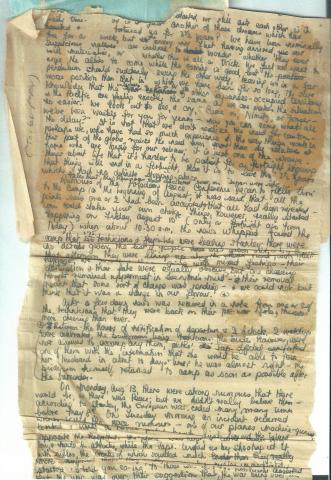
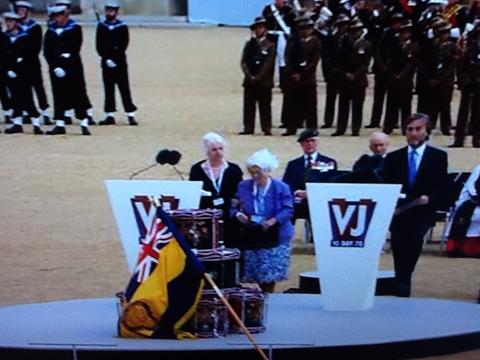
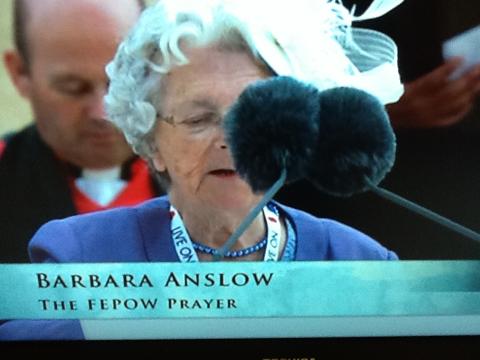
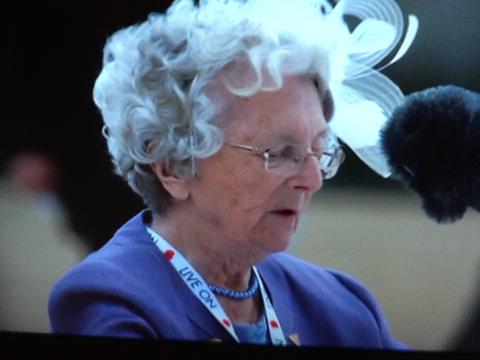

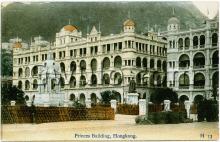
Comments
Barbara's speech on iPlayer
If you have access to BBC's iPlayer, Laurence Porter left a comment on facebook that:
Barbara's speech is available on BBC iPlayer - programme is VJ70 with Kirsty Young and the speech is at 50:10
The Cameron family
Henry Ching writes:
I notice that in her most interesting account headed “Is it really true?” Barbara Anslow refers to the arrival in Stanley in August, 1945 of the two boys, David and James Cameron, on the passing of their mother. In fact, Muriel Cameron happily survived the occupation. She was living in the French Hospital in Causeway Bay with her two sons, but became too ill to look after them, and that is why they were sent in to Stanley. The boys’ father was Bill Cameron, a Police Inspector who was interned in Stanley. The family was reunited after the war. Muriel’s mother, Florence Smith, was with them in the French Hospital, but died with cancer in June, 1944 – this is mentioned in my father’s diary. She is buried in the Colonial (Hong Kong) Cemetery. Also mentioned on her grave inscription is her husband, Captain S.G.Smith MBE who died in July, 1944 but I believe he is actually buried in Stanley Military Cemetery. He was in the HKVDC and was a POW in Argyle Street. With him was his son, N.L.Smith, who was a signalman in the HKVDC and who served as a batman in Argyle Street Camp. David and James Cameron appear in photos on the Gwulo website, at a birthday party after the war.